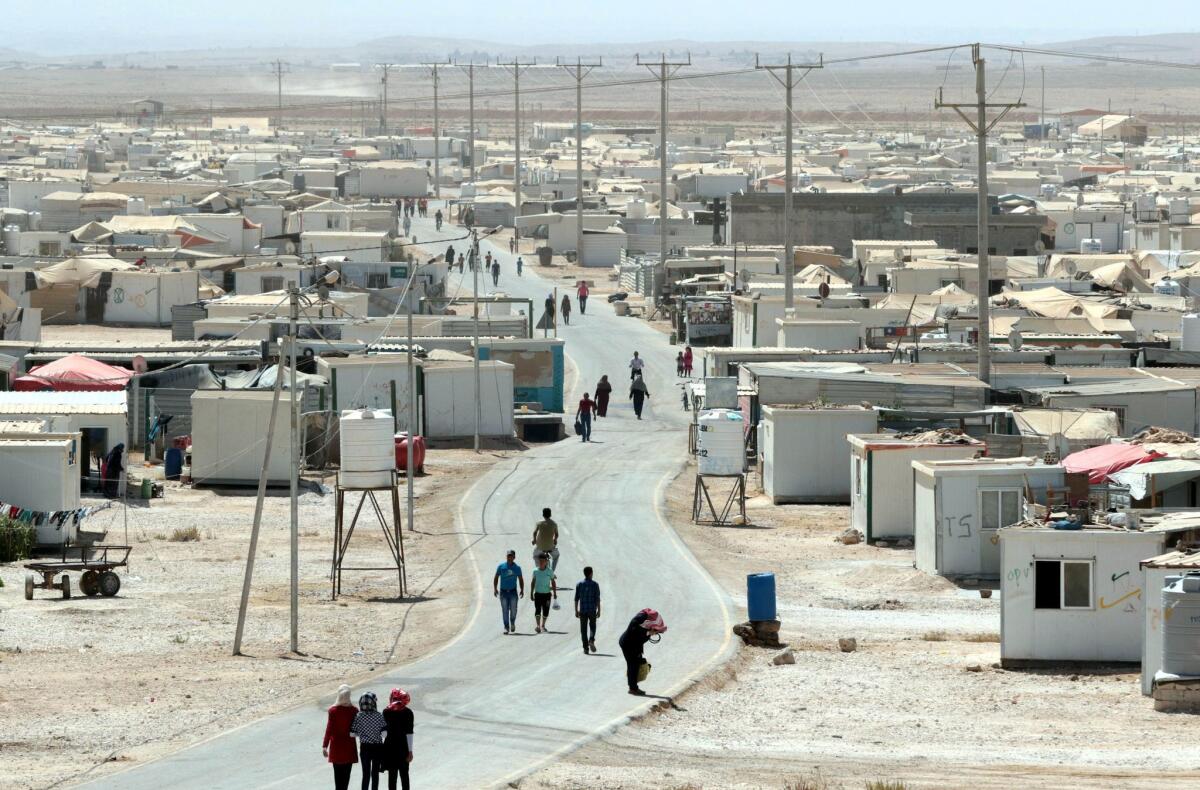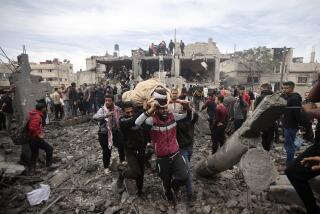Op-Ed: 60 million refugees: a crisis that has outgrown its 65-year-old solution

This photo taken Sept. 19, 2015 shows a general view of the massive U.N.-run Zaatari camp for Syrian refugees, located northeast of the Jordanian capital of Amman.
The number of refugees, asylum-seekers and other displaced persons exceeded 60 million globally last year. More than half of the refugees have been uprooted not for months, but for years upon years.
It’s clear that the international legal framework for responding to such crises — the 1951 Refugees Convention — is insufficiently comprehensive to deal with a situation of this magnitude and complexity. Created to respond to the 1 million Europeans still displaced years after World War II ended, the convention was the first treaty to codify legal rights for refugees. And while its scope was expanded in 1967, the framework does not extend to cover all those in need of protection.
For instance, it defines a refugee as someone unable to return to their country owing to a “well-founded fear of being persecuted for reasons of race, religion, nationality, membership of a particular social group or political opinion.” Certainly not all those fleeing Syria meet these criteria. They are, however, fleeing violent conflict, state collapse and brutal extremism, and most would agree that they deserve international protection. Yet how, and how long, countries should shelter such persons are difficult questions — not only because they touch on the sensitive issue of state sovereignty, but because of the sheer number of refugees.
Further, while host states are required to accept and keep asylum seekers, there are no binding rules on sharing the financial burden. Donor states can (and do) scale back their aid once the emergency phase has passed, leaving hosts to struggle on alone. My own country, for example, is sheltering 635,000 U.N.-registered refugees, but in 2015 Jordan’s response plan received only 34% of the funding it needed.
The convention also has been unable to induce states to act in the manner intended. Australia, for example, has entered into agreements with Nauru and other neighbors to process refugee claims offshore — essentially outsourcing its convention obligations. (Jordan, Lebanon and Iraq, by contrast — which are not parties to the convention — collectively host approximately 6 million refugees.) And what can be made of Europe’s behavior? Surely giving Turkey $3 billion and other incentives to prevent asylum-seekers from crossing into Europe is expedient, but hardly within the spirit of the convention.
The current refugee crisis in Europe has brought these challenges to the fore; in particular, it is clear that countries which enjoy wealth and safety do not want to host refugees in large numbers, nor forever.
New solutions are required that address the reluctance of traditional resettlement countries to absorb vast numbers of refugees permanently, as well as the frustrations of host states about unequal burden sharing.
These might include the notion of temporary protection. Research suggests that short-term migration can benefit both the individual and the destination country. These gains are not only economic. Migrants absorb civic and institutional norms that they bring back to their societies. Temporary protection also overcomes the issue of stripping a society of the very people it needs most post-conflict. Those Syrians seeking a life in Europe (and those resettled) are disproportionally educated and employable. From a utilitarian perspective, it is preferable that they repatriate when the war ends and contribute to reconstruction and state-building. If they take with them some acquired governance values, all the better.
Research suggests that short-term migration can benefit both the individual and the destination country.
Greater thought also should be invested in how safe havens might be made more effective. If European nations had to choose between the current refugee crisis, or working together to operationalize a safe zone within Syria that was actually secure, my bet is that they’d choose the latter. Safe havens, historically, have had appalling track records at protecting vulnerable groups, but the idea itself is not unsound. One might imagine a refugee camp in a Syrian safe zone protected by a coalition of international forces, where small businesses operate unhindered and Syrian teachers run the schools. (Indeed, one factor behind the low school enrollment at Jordan’s Zaatari refugee camp is that Syrian students did not want to transfer to the unfamiliar Jordanian curriculum.)
Safe zones are far from perfect, but they do create greater scope for continuity and autonomy, both of which aid in the reintegration and rehabilitation process when a conflict ends. Moreover, just because we have not been able to get safe havens right in the past does not mean we should abandon the concept.
If, however, refugees are unable to return home, host countries must be offered solutions that are in — or at least not contrary to — their national interest. The London conference on the Syrian conflict in early February was a promising development in this regard. Donor nations pledged money, but also aid for elements that Jordan needs to grow its economy: infrastructure, education and jobs for refugees.
Finally, the regions that face the most dramatic refugee issues might consider localized regulatory arrangements along the lines of those implemented by the African Union (the 1969 Convention Governing Specific Aspects of Refugee Problems in Africa) and in the Americas (the 1984 Cartagena Declaration). Such arrangements can support more context-specific burden-sharing and financing mechanisms that take into account the assets and challenges of each participating country.
It should go without saying that human dignity, the right to live with freedom and without fear, and empathy for humankind should underpin any arrangement for the care of displaced people. When the Refugee Convention was signed in 1951, European countries were grappling with a crisis of mass displacement from war. How paradoxical that a similar crisis today reveals the Refugee Convention as deeply imperiled.
Prince El Hassan bin Talal of Jordan is chairman and founder of the West Asia-North Africa Institute.
Follow the Opinion section on Twitter @latimesopinion and Facebook
More to Read
A cure for the common opinion
Get thought-provoking perspectives with our weekly newsletter.
You may occasionally receive promotional content from the Los Angeles Times.






